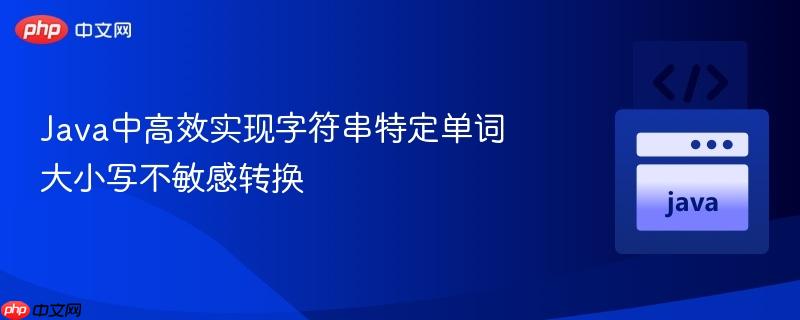
在字符串处理中,我们经常会遇到需要将特定单词(例如"hello")的所有大小写变体(如"hello", "hello", "hello"等)统一转换为目标大小写(如全部小写"hello")的需求。初学者往往会尝试使用string.replace()方法进行替换,例如:
String text = " HeLlo this is my program called HELLO ";
text = text.replace("HELLO", "hello");
text = text.replace("Hello", "hello");
// ... 针对所有可能的大小写组合进行替换这种方法的问题在于,如果一个单词有多种大小写形式,就需要编写大量的replace()语句来覆盖所有情况。这不仅代码冗余、效率低下,而且难以维护,尤其当需要处理的单词数量增多时,这种方法的弊端会更加突出。
Java提供了强大的正则表达式(Regular Expression)功能,可以优雅地解决上述问题。String类的replaceAll()方法接受正则表达式作为第一个参数,并支持多种修饰符来改变匹配行为。其中,大小写不敏感匹配是解决此问题的关键。
要实现大小写不敏感的替换,最简洁的方式是在正则表达式中使用内联修饰符(?i)。这个修饰符会使后续的正则表达式匹配忽略大小写。
语法格式如下:
立即学习“Java免费学习笔记(深入)”;
String result = originalString.replaceAll("(?i)yourWord", "targetWord");其中:
示例代码:
假设我们要将字符串中所有形式的"hello"替换为小写的"hello"。
public class CaseInsensitiveReplacement {
public static void main(String[] args) {
String input = " HeLlo this is my program called HELLO ";
System.out.println("原始字符串: " + input);
// 使用replaceAll和(?i)修饰符进行大小写不敏感替换
String output = input.replaceAll("(?i)hello", "hello");
System.out.println("替换后字符串: " + output);
// 预期输出: 替换后字符串: hello this is my program called hello
}
}运行上述代码,你会发现无论原始字符串中的"hello"以何种大小写形式出现,都会被正确地替换为小写的"hello"。
(?i)是正则表达式中的一个标志,表示开启大小写不敏感模式(case-insensitive mode)。一旦在正则表达式中使用了它,其后的模式匹配将不再区分字母的大小写。这比在Pattern.compile()方法中传入Pattern.CASE_INSENSITIVE标志更简洁,尤其适用于简单的替换场景。
在使用正则表达式进行字符串替换时,有几个重要的点需要注意:
因此,要使用大小写不敏感匹配等正则表达式功能,必须使用replaceAll()。
在某些情况下,你可能希望只替换作为独立单词出现的"hello",而不是作为其他单词一部分的"hello"(例如"hellos"中的"hello")。这时,可以使用单词边界\b:
String input = " Hello hellos HeLloWorld HELLO ";
// 匹配独立的"hello"
String output = input.replaceAll("(?i)\bhello\b", "hello");
System.out.println(output); // 输出: hello hellos HeLloWorld hello\b代表一个单词边界,确保只匹配完整的单词。
如果需要替换的单词本身包含正则表达式的特殊字符(如.、*、+、?、(、)等),这些字符在正则表达式中具有特殊含义。直接使用它们可能会导致意外的匹配结果或PatternSyntaxException。
为了安全地匹配这些特殊字符,你需要对它们进行转义。Pattern.quote()方法可以帮助你完成这个任务:
String specialWord = "H.E.L.L.O?"; // 假设要替换的单词是 "H.E.L.L.O?"
String escapedWord = Pattern.quote(specialWord); // 结果可能是 "H\.E\.L\.L\.O\?"
String inputWithSpecialChars = " This is H.E.L.L.O? and another h.e.l.l.o? ";
String outputWithSpecialChars = inputWithSpecialChars.replaceAll("(?i)" + escapedWord, "h.e.l.l.o?");
System.out.println(outputWithSpecialChars);
// 预期输出: This is h.e.l.l.o? and another h.e.l.l.o?对于少量替换操作,String.replaceAll()的性能通常足够。但如果需要在一个非常大的字符串上进行大量复杂的正则表达式替换,或者需要重复执行相同的替换模式,可以考虑预编译Pattern对象以提高效率:
import java.util.regex.Pattern;
public class OptimizedReplacement {
public static void main(String[] args) {
String input = " HeLlo this is my program called HELLO ";
// 预编译Pattern对象,并指定CASE_INSENSITIVE标志
Pattern pattern = Pattern.compile("hello", Pattern.CASE_INSENSITIVE);
// 使用Matcher进行替换
String output = pattern.matcher(input).replaceAll("hello");
System.out.println("替换后字符串: " + output);
}
}这种方式在循环中多次使用同一正则表达式时,可以避免每次都重新编译正则表达式,从而提高性能。
在Java中,要高效、简洁地将字符串中特定单词的所有大小写形式统一转换为目标大小写,最佳实践是利用String.replaceAll()方法结合正则表达式的(?i)内联修饰符。这种方法避免了繁琐的多条件替换,提高了代码的可读性和可维护性。同时,根据具体需求,可以进一步结合\b进行单词边界匹配,或使用Pattern.quote()处理特殊字符,甚至预编译Pattern对象以优化性能。掌握这些技巧,将使你的字符串处理能力更上一层楼。
以上就是Java中高效实现字符串特定单词大小写不敏感转换的详细内容,更多请关注php中文网其它相关文章!

每个人都需要一台速度更快、更稳定的 PC。随着时间的推移,垃圾文件、旧注册表数据和不必要的后台进程会占用资源并降低性能。幸运的是,许多工具可以让 Windows 保持平稳运行。

Copyright 2014-2025 https://www.php.cn/ All Rights Reserved | php.cn | 湘ICP备2023035733号